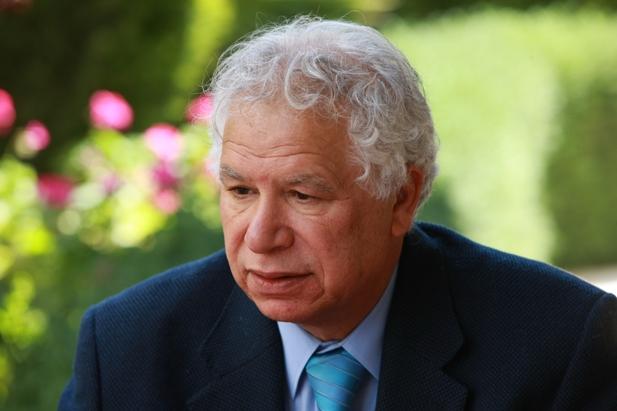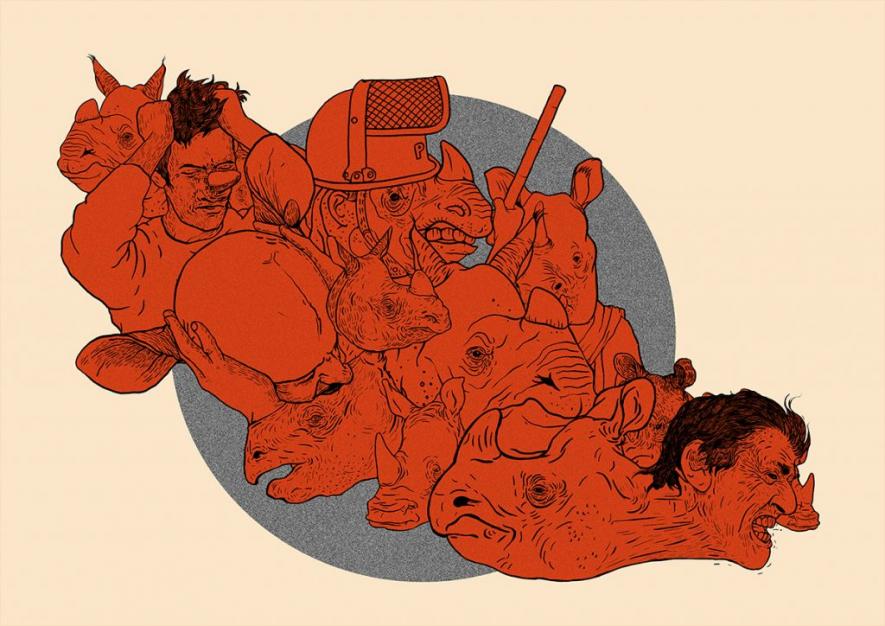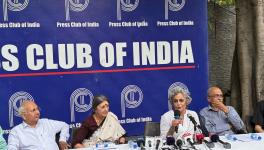The Passing of Mourid Barghouti: Palestinian Poet of/in Exile

Image Courtesy: Wikimedia Commons
Mourid Barghouti, renowned Palestinian poet and author passed away on February 14th in Amman. He is survived by his son, the poet Tamim Albarghouti, and was married to the late Egyptian novelist, Radwa Ashour. He had visited India in 2016 for a series of events organised by the feminist publication, Women Unlimited and held a special place as a friend for Palestine solidarity activists in India.
Mourid’s own life, like that of millions of Palestinians, was deeply tied to the political realities of their homeland. He was born in 1944 in Deir Ghassana village, near Ramallah. He was studying in Cairo in 1967 when Israel occupied Palestinian territories, and was only able to return to his village, to his homeland 30 years later. This trip inspired his autobiographical novel Ra’aytu Ram Allah (I Saw Ramallah). Soon after the birth of his son, he was exiled from Egypt too, where he returned in 1994 after 17 years.
During his visit to India, he sat down for an interview with Githa Hariharan. The short twelve minutes of this conversation reveal the many layers of Barghouti’s poetry and its grounding. He talks about how commitment to the craft and excelling in it goes against the very objective of occupation or any other form of suppression of a people. Such a regime seeks to stifle the everyday life of people, and by living, loving, writing, by simply existing in the best way possible, people defeat it everyday. “Palestine does not need a bad poem”, says Barghouti with his wry sense of humour.
At a time when our own everyday lives and actions are under scrutiny and repression, where thoughts are policed and dissent criminalised, we feel the loss of a poet and friend like him more acutely. And we also find solace in his words. Here we reshare his conversation with Githa Hariharan which ends with him reading his poem, “I Have No Problem”, translated into English by Radwa Ashour, followed by its translation into Hindustani by Ayesha Kidwai.
सब चंगा सी
मैं अपने आप को देखता हूँ:
सब चंगा सी.
अच्छा ही तो दिखता हूँ,
और कुछ लड़कियों को तो,
मेरे पक्के बाल भी भा जाएं;
मेरा चश्मा सुड़ौल है,
शरीर का तापमान ठीक ३७ डिग्री.
इस्त्री-की हुई कमीज़ है मेरी, और मेरे जुते काटते नहीं.
सब चंगा सी.
मेरे हाथ हथकड़ी नहीं पहने है,
मेरी जुबां आज तक ख़ामोश नहीं की गई है,
अब तक, मैं दण्डित नहीं हुआ हूँ
ना तो नौकरी से बर्ख़ास्त;
जेल में रिश्तेदारों से मिलने की इजाज़त है मुझे,
और कुछ अन्य देशों में कुछ की कब्रों का दौरा करने की अनुमति भी.
सब चंगा सी.
मैं हैरान नहीं कि मेरे दोस्त ने
अपने सर पर एक सींग उगा लिया है,
सराहना करता हूँ उस चतुराई की,
जिससे उसने अपनी नुमाया पूँछ कपड़ों में छुपाई है,
और भाते हैं मुझे उसके पुरसुकून पंजे.
मेरी हत्या कर सकता है वो,
पर मैं उसे माफ़ कर दूंगा
क्यूंकि वो मेरा दोस्त है;
मुझे कभी-कभार चोट पहुंचाने का हक़ है उसे.
सब चंगा सी.
टीवी एंकर की बत्तीसी देखकर,
अब मेरा जी नहीं मतलाता,
और ख़ाकी का रात-दिन मेरे रंग उतारने का
आदी हो गया हूँ.
इसीलिए
मैं अपने पेहचान पत्र हमेशा अपने साथ रखता हूँ
स्विमिंग पूल में भी.
सब चंगा सी.
कल, मेरे ख़्वाब रात की रेलगाड़ी से रवाना हुए,
और मैं बूझ ही नहीं पाया की उन्हें कैसे अलविदा कहूं.
सुना है कि रेलगाड़ी की दुर्घटना हुई
एक वीरान वादी में
(सिर्फ चालक ही बचा).
मैं ने ख़ुदा का शुक्र अदा किया,
और फिर सुस्ताया
क्यूंकि मुझे छोटे-छोटे बुरे सपने आते हैं
जो मैं आशा करता हूँ की एक दिन चलकर बड़े ख़्वाब बनेंगे.
सब चंगा सी.
मैं अपने आप को देखता हूँ, जनम के दिन से आज तक.
मायूसी में याद करता हूँ कि
मौत के बाद भी तो ज़िन्दगी है;
मौत के बाद भी ज़िन्दगी है,
और सब चंगा सी.
पर यह सवाल भी पूछता हूँ:
ऐ मेरे खुदा!
मौत से पहले भी क्या ज़िन्दगी है?

“I will not be a rhinoceros” by Mad Paule, New Delhi; Digital print on canvas. Image courtesy of the artist.
From his experience at Tahrir Square, Cairo, where Barghouti was present in 2011 during the uprising and saw at firsthand the one-million strong protests that called for “the downfall of the regime”, Barghouti wrote of the tyrants of our time.
पानी की फ़र्माबरदारी
कितनी कला, बारीक़ सोच, हिचकिचाहट, और क़ुरबानी की रातें,
कम या ज़्यादा कीमत अदा कर,
तुम्हें लगती हैं एक सरल सा
आला अविष्कार करने में?
एक तानाशाह बनाने में तुम्हें सिर्फ
एक बार ही घुटना टेकना है.
****
नहीं, वो कोई राइनो नहीं है, ना कोई अजूबा,
दरअसल, हो सकता है कि वो तुम्हारी ही तरह दिखे. या मेरे जैसे.
बुद्धू मत बनो. वो उसके पंजे थोड़ी हैं
बस मामूली नाख़ून हैं, ठीक तुम्हारे जैसे.
और नहीं, ये उसके खुर नहीं
ये उसके सिर्फ आठ, या शायद नौ, नंबर के जूते हैं.
जितना तुम सोचते हो, वो उस से कहीं ज़्यादा हल्का है. नहीं, एक टन से कहीं कम.
एक आम आदमी का वज़न ही है उसका
सत्तर-अस्सी किलो से ज़्यादा नहीं
क्या वो उसका सींघ है? नहीं
वो बस उसकी छोटी, चपटी, चढ़ी हुई नाक है, और हाँ
तुम्हारे और मेरे जैसे, उसे भी नज़ला हो सकता है. ख़ून भी उसका बह सकता है.
जब वो कुर्सी पर विराजमान होता है
वो कोइ बादलों पर सवार आसमान से नहीं उतरता
नहीं, तुम्हारे और मेरे कन्धों पर लद-चढ़कर
काल की गद्दी पर पैर झुलाये बैठता है.
वो भी सिर्फ दो ही पैर हैं, छः नहीं, चेक करना चाहो तो.
उसका आइना उस पर फ़िदा है. वो अपने आइने पर फ़िदा है. दोनों का अमर प्रेम.
उसे क़ानून से बेहद लगाव है. जो भी घर वो जलाता है, जिसका भी वो क़त्ल करता है,
जिस भी नरसंहार का वो आदेश देता है, सब क़ानून के दायरे में ही होता है.
अपनी अक़्ल की तौहीन मत करो, मत बैठो
आस लगाए. इस जोत को टिमटिमाना है, बुझना है, और एकाएक फिर झिलमिलाना है
जब तक यह गद्दी पर है.
***
वो अपने नखरों को भी अपने बलबूते का निशाँ मानता है.
वो चाहता है कि हम पानी की तरह बने
जो प्याले की तह में जमा रहे.
जब वो हमें उँडेले, हम झुक जाएं
बिना एक लफ्ज़ कहे.
पर जब हम, उसकी मर्ज़ी मुताबिक़, पानी बन गए
तो उसके हाथ फ़रियाद में उठ पड़े,
हैरान कि वो डूब रहा है.
The Obedience of Water
Translated into English by George Szirtes
How many nights of art, close study, hesitation and sacrifice, at little or great expense, do you need to invent
the simplest of gadgets?
All you need to invent a tyrant is a single
bend of the knee.
***
No, he’s not a rhino, not a miracle,
in fact he may look like you. Or me.
Don’t be fooled. Those are not his claws
they are perfectly normal nails like yours.
Nor are those hooves, no
they are his size eight,
possibly size nine, shoes.
He’s less heavy than you think. No, not a ton,
just the weight of an ordinary man,
say seventy or eighty kilos.
Is that his horn? No
its his smug little, snub little nose and, yes,
he might catch a cold like you and I
He might even bleed.
When he takes his seat he doesn’t descend from heaven
on a cloud, no, he climbs up on our shoulders, yours and mine
and sits in the saddle of time dangling his legs,
two legs not six, if you care to check
His mirror loves him. He loves his mirror. The love is mutual.
He adores the law. Any house he burns, anyone he kills,
any massacre he orders, is done in full accordance with the law.
Dont insult your own intelligence
by hoping. Let that flame flicker, die, and unaccountably flicker again
while he’s in charge.
***
He regards even his tantrums as a sign of strength.
He would prefer us to be as water,
to see us stagnating at the bottom of the cup.
We must bow when he pours us out, Not allowing a word to escape
and yet when we behaved like water as he intended
he raised his hands in mute appeal, astonished to be drowning.
Courtesy: Indian Cultural Forum
Get the latest reports & analysis with people's perspective on Protests, movements & deep analytical videos, discussions of the current affairs in your Telegram app. Subscribe to NewsClick's Telegram channel & get Real-Time updates on stories, as they get published on our website.
























